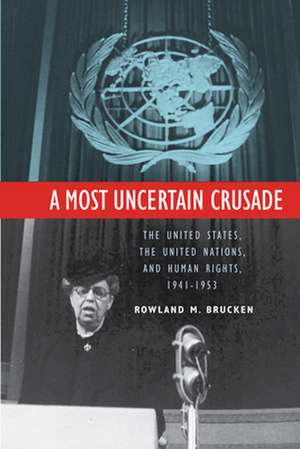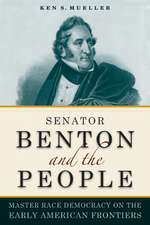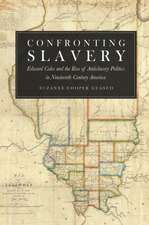A Most Uncertain Crusade: The United States, the United Nations, and Human Rights, 1941-1953
Autor Rowland Bruckenen Limba Engleză Paperback – 14 ian 2014
A Most Uncertain Crusade traces and analyzes the emergence of human rights as both an international concern and as a controversial domestic issue for U.S. policy makers during and after World War II. Historian Brucken focuses on officials in the State Department, at the United Nations, and within certain domestic non-governmental organizations, and explains why, after issuing wartime declarations that called for the definition and enforcement of international human rights standards, the U.S. government refused to ratify the first U.N. treaties that fulfilled those twin purposes. The Truman and Eisenhower administrations worked to weaken the scope and enforcement mechanisms of early human rights agreements, and gradually withdrew support for Senate ratification. A small but influential group of isolationist–oriented senators, led by John Bricker (R-OH), warned that the treaties would bring about socialism, destroy white supremacy, and eviscerate the Bill of Rights. At the U.N., a growing bloc of developing nations demanded the inclusion of economic guarantees, support for decolonization, and strong enforcement measures, all of which Washington opposed.
Prior to World War II, international law considered the protection of individual rights to fall largely under the jurisdiction of national governments. Alarmed by fascist tyranny and guided by a Wilsonian vision of global cooperation in pursuit of human rights, President Roosevelt issued the Four Freedoms and the Atlantic Charter. Behind the scenes, the State Department planners carefully considered how an international organization could best protect those guarantees. Their work paid off at the 1945 San Francisco Conference, which vested the U.N. with an unprecedented opportunity to define and protect the human rights of individuals.
After two years of negotiations, the U.N. General Assembly unanimously approved its first human rights treaty, the Genocide Convention. The U.N. Commission on Human Rights (UNCHR), led by Eleanor Roosevelt, drafted the nonbinding Universal Declaration of Human Rights in 1948. Subsequent efforts to craft an enforceable covenant of individual rights, though, bogged down quickly. A deadlock occurred as western nations, communist states, and developing countries disagreed on the inclusion of economic and social guarantees, the right of self-determination, and plans for implementation.
Meanwhile, a coalition of groups within the United States doubted the wisdom of American accession to any human rights treaties. Led by the American Bar Association and Senator Bricker, opponents proclaimed that ratification would lead to a U.N. led tyrannical world socialistic government. The backlash caused President Eisenhower to withdraw from the covenant drafting process. Brucken shows how the American human rights policy had come full circle: Eisenhower, like Roosevelt, issued statements that merely celebrated western values of freedom and democracy, criticized human rights records of other countries while at the same time postponed efforts to have the U.N. codify and enforce a list of binding rights due in part to America’s own human rights violations.
Prior to World War II, international law considered the protection of individual rights to fall largely under the jurisdiction of national governments. Alarmed by fascist tyranny and guided by a Wilsonian vision of global cooperation in pursuit of human rights, President Roosevelt issued the Four Freedoms and the Atlantic Charter. Behind the scenes, the State Department planners carefully considered how an international organization could best protect those guarantees. Their work paid off at the 1945 San Francisco Conference, which vested the U.N. with an unprecedented opportunity to define and protect the human rights of individuals.
After two years of negotiations, the U.N. General Assembly unanimously approved its first human rights treaty, the Genocide Convention. The U.N. Commission on Human Rights (UNCHR), led by Eleanor Roosevelt, drafted the nonbinding Universal Declaration of Human Rights in 1948. Subsequent efforts to craft an enforceable covenant of individual rights, though, bogged down quickly. A deadlock occurred as western nations, communist states, and developing countries disagreed on the inclusion of economic and social guarantees, the right of self-determination, and plans for implementation.
Meanwhile, a coalition of groups within the United States doubted the wisdom of American accession to any human rights treaties. Led by the American Bar Association and Senator Bricker, opponents proclaimed that ratification would lead to a U.N. led tyrannical world socialistic government. The backlash caused President Eisenhower to withdraw from the covenant drafting process. Brucken shows how the American human rights policy had come full circle: Eisenhower, like Roosevelt, issued statements that merely celebrated western values of freedom and democracy, criticized human rights records of other countries while at the same time postponed efforts to have the U.N. codify and enforce a list of binding rights due in part to America’s own human rights violations.
| Toate formatele și edițiile | Preț | Express |
|---|---|---|
| Paperback (1) | 335.96 lei 6-8 săpt. | |
| Northern Illinois University Press – 14 ian 2014 | 335.96 lei 6-8 săpt. | |
| Hardback (1) | 422.91 lei 6-8 săpt. | |
| Northern Illinois University Press – 30 noi 2013 | 422.91 lei 6-8 săpt. |
Preț: 335.96 lei
Nou
Puncte Express: 504
Preț estimativ în valută:
64.29€ • 69.81$ • 54.01£
64.29€ • 69.81$ • 54.01£
Carte tipărită la comandă
Livrare economică 23 aprilie-07 mai
Preluare comenzi: 021 569.72.76
Specificații
ISBN-13: 9780875807188
ISBN-10: 0875807186
Pagini: 450
Dimensiuni: 152 x 229 x 25 mm
Greutate: 0.5 kg
Editura: Northern Illinois University Press
Colecția Northern Illinois University Press
ISBN-10: 0875807186
Pagini: 450
Dimensiuni: 152 x 229 x 25 mm
Greutate: 0.5 kg
Editura: Northern Illinois University Press
Colecția Northern Illinois University Press
Recenzii
“This complex and comprehensively documented book lays bare the convoluted history of U.S. human rights policy and practice since World War II.”
—The Journal of American History
“This is an important and substantial work. Rowland Brucken’s effort to describe how the U.S. support of human rights died amid debates over national security, the sanctity of the Constitution, and uncertainty about how to deal with the nation’s own embarrassing racial problems, is admirable and significant.”
—Michael Krenn, Appalachian State University
—The Journal of American History
“This is an important and substantial work. Rowland Brucken’s effort to describe how the U.S. support of human rights died amid debates over national security, the sanctity of the Constitution, and uncertainty about how to deal with the nation’s own embarrassing racial problems, is admirable and significant.”
—Michael Krenn, Appalachian State University
“A Most Uncertain Crusade fills an important gap in human rights literature. In clear, engaging analysis, Brucken patiently walks the reader through the process that made human rights largely symbolic without the resources, verve, and enforcement necessary to address the deep needs that World War II uncovered. By focusing on three distinct actors in this drama—presidential administrations, NGO’s, and isolationists and reactionaries—Brucken unpacks the motivations, the compromises, the deals, and the effects that this trio had in shaping U.S. and U.N. human rights policies. No one else has done this work.”
—Carol Anderson, Emory University
—Carol Anderson, Emory University
Notă biografică
Rowland Brucken is associate professor of history and chair of the Department of History and Political Science at Norwich University.
Descriere
A Most Uncertain Crusade traces and analyzes the emergence of human rights as both an international concern and as a controversial domestic issue for U.S. policy makers during and after World War II. Historian Brucken focuses on officials in the State Department, at the United Nations, and within certain domestic non-governmental organizations, and explains why, after issuing wartime declarations that called for the definition and enforcement of international human rights standards, the U.S. government refused to ratify the first U.N. treaties that fulfilled those twin purposes. The Truman and Eisenhower administrations worked to weaken the scope and enforcement mechanisms of early human rights agreements, and gradually withdrew support for Senate ratification. A small but influential group of isolationist–oriented senators, led by John Bricker (R-OH), warned that the treaties would bring about socialism, destroy white supremacy, and eviscerate the Bill of Rights. At the U.N., a growing bloc of developing nations demanded the inclusion of economic guarantees, support for decolonization, and strong enforcement measures, all of which Washington opposed.
Prior to World War II, international law considered the protection of individual rights to fall largely under the jurisdiction of national governments. Alarmed by fascist tyranny and guided by a Wilsonian vision of global cooperation in pursuit of human rights, President Roosevelt issued the Four Freedoms and the Atlantic Charter. Behind the scenes, the State Department planners carefully considered how an international organization could best protect those guarantees. Their work paid off at the 1945 San Francisco Conference, which vested the U.N. with an unprecedented opportunity to define and protect the human rights of individuals. After two years of negotiations, the U.N. General Assembly unanimously approved its first human rights treaty, the Genocide Convention. The U.N. Commission on Human Rights (UNCHR), led by Eleanor Roosevelt, drafted the nonbinding Universal Declaration of Human Rights in 1948. Subsequent efforts to craft an enforceable covenant of individual rights, though, bogged down quickly. A deadlock occurred as western nations, communist states, and developing countries disagreed on the inclusion of economic and social guarantees, the right of self-determination, and plans for implementation.
Meanwhile, a coalition of groups within the United States doubted the wisdom of American accession to any human rights treaties. Led by the American Bar Association and Senator Bricker, opponents proclaimed that ratification would lead to a U.N. led tyrannical world socialistic government. The backlash caused President Eisenhower to withdraw from the covenant drafting process. Brucken shows how the American human rights policy had come full circle: Eisenhower, like Roosevelt, issued statements that merely celebrated western values of freedom and democracy, criticized human rights records of other countries while at the same time postponed efforts to have the U.N. codify and enforce a list of binding rights due in part to America’s own human rights violations.
Prior to World War II, international law considered the protection of individual rights to fall largely under the jurisdiction of national governments. Alarmed by fascist tyranny and guided by a Wilsonian vision of global cooperation in pursuit of human rights, President Roosevelt issued the Four Freedoms and the Atlantic Charter. Behind the scenes, the State Department planners carefully considered how an international organization could best protect those guarantees. Their work paid off at the 1945 San Francisco Conference, which vested the U.N. with an unprecedented opportunity to define and protect the human rights of individuals. After two years of negotiations, the U.N. General Assembly unanimously approved its first human rights treaty, the Genocide Convention. The U.N. Commission on Human Rights (UNCHR), led by Eleanor Roosevelt, drafted the nonbinding Universal Declaration of Human Rights in 1948. Subsequent efforts to craft an enforceable covenant of individual rights, though, bogged down quickly. A deadlock occurred as western nations, communist states, and developing countries disagreed on the inclusion of economic and social guarantees, the right of self-determination, and plans for implementation.
Meanwhile, a coalition of groups within the United States doubted the wisdom of American accession to any human rights treaties. Led by the American Bar Association and Senator Bricker, opponents proclaimed that ratification would lead to a U.N. led tyrannical world socialistic government. The backlash caused President Eisenhower to withdraw from the covenant drafting process. Brucken shows how the American human rights policy had come full circle: Eisenhower, like Roosevelt, issued statements that merely celebrated western values of freedom and democracy, criticized human rights records of other countries while at the same time postponed efforts to have the U.N. codify and enforce a list of binding rights due in part to America’s own human rights violations.














